About
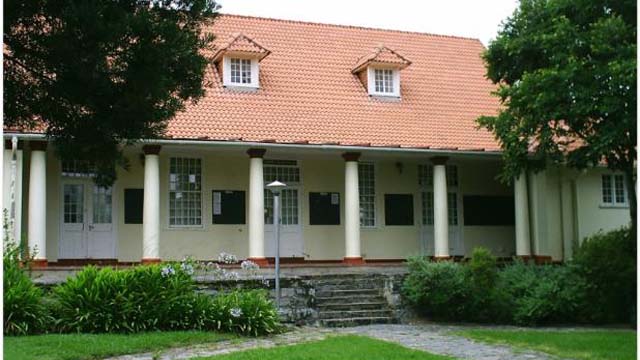
The Founders’ Hall comprises a central Dining Hall and four Houses: Botha (and the Founders’ Annexe), The College, Cory, Matthews, accommodating 68, 47, 35 and 35 students respectively. The Hall Warden, in conjunction with the Hall Committee, administers the Hall. The Committee has both staff and student members and is responsible for the general welfare of all Hall members.
Historically The Founders’ Hall is inextricably linked with the start of residential development at Rhodes. Indeed, The College House (built in 1913) was the first new building of the early Rhodes University College, while the Founders’ Dining Hall (in use by 1920) was commissioned as soon as the College Council realised the need for students "to feed together under proper and seemly conditions". Today meals are still served in the Hall and guest evenings are still customary. The second men's residence, Botha House, soon followed in 1922 and when further expansion became necessary after the war, Cory and Matthews were added in 1945 and 1946 respectively. Founders’, therefore, today has buildings of character, centrally situated and in close proximity to most academic and administrative buildings, the sporting fields and facilities, the University Library and the Students' Union.
The history of the Hall is closely tied with the work of the four foundation professors of Rhodes: Arthur Matthews, George Cory, A Stanley Kidd and G F Dingemans. Their portraits hang in the Dining Hall. Arthur Matthews was born in Scotland and came to Grahamstown in 1875 to teach at St Andrew's College. When the University College was founded in 1904 Professor Matthews became first chairman of the Senate. He was also the first Professor of Pure Mathematics and was the authority in Southern Africa on land surveying. George Cory was the first professor of Physical Science, although by nature he was an historian. His magnum opus, "The Rise of South Africa" is well known. In 1920 he received a knighthood in recognition of his services to the writing of South Africa's history. In 1925 Cambridge University, where he had originally studied, awarded him the degree of Doctor of Letters, honoris causa. The Cory Library for Historical Research at Rhodes is named after him. Stanley Kidd was the first professor of Greek, Latin, English, History and Philosophy. He was also the first Honorary Secretary of the Senate and was one of the first persons to make a full study of the subject of Higher Education in South Africa. George Dingemans was the first Professor of Modern Languages at Rhodes and was a man of great learning.
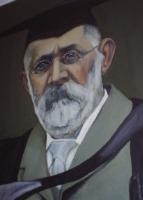 |
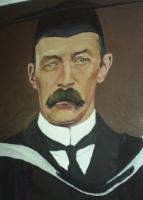 |
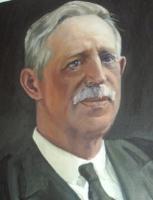 |
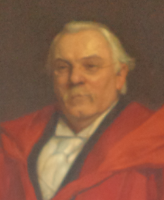 |
| Professor Arthur Matthews |
Professor Stanley Kidd |
Professors George Dingemans | Professor George Cory |
Other portraits in the Dining Hall are those of former Masters of The Hall - Major E B Walker MBE, Professor J J Gerber, Dr J T Powell, and Professors D R Woods, A J Penny and P G Surtees. Major Walker was Registrar of the University for twenty-one years as well as being Hall Warden between 1921 and 1949. Stories abound about him and his habit of keeping a bulldog. In fact he had three bulldogs, each named Binks. Professor J J Gerber was another long serving Warden of the Hall (1956 to 1963 and 1968 to 1976) and in his time became a legend. Professor D Woods (1977 - 1979), a past Vice-Chancellor, had the University alter the title of Hall Warden to Master of The Hall. Mr J D Powell held the position between 1950 and 1954. Above the high table is a portrait of Dr D S Henderson, past Vice-Chancellor of Rhodes and a former resident of The College House. Next to it is the portrait of the Right Rev B B Burnett, formerly Archbishop of Cape Town, who was also a resident of The College House in his student days. Portraits of Professor Guy Butler, poet, historian, author and English scholar and of Professor Alastair Kerr, former Dean of Law, complete the collection.
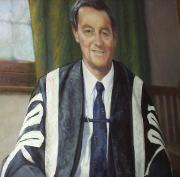 |
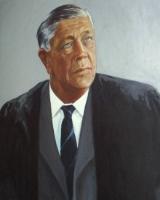 |
| Vice-Chancellor Dereck Henderson | Professor Koos Gerber |
With a few exceptions, members of The Hall are accommodated in single rooms. The Hall is surrounded by its own gardens and recreational and games facilities are provided here and in the common rooms of the Houses.
In The Hall, then, is to be found the theory, basis and spirit of the residential system at Rhodes. In their Houses students live, work and sleep, whilst in their Hall they take their meals together. The Hall provides the focus and binding link of the common life, loyalty and corporate spirit of students living as members of an ordered academic family. The Hall expects its members to contribute to this family as much as they derive from it. It aims at promoting an amicable atmosphere conducive to study and a full participation in all spheres of University life.
Last Modified :Tue, 15 Mar 2022 12:05:11 SAST
